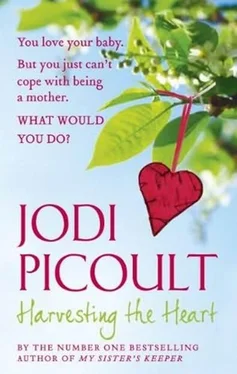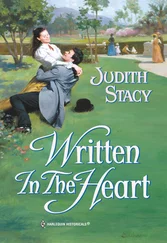Josh walked to the phone, and I sat by my mother. “Go back to bed,” I told her. “Josh and I can take care of this.”
“Like hell you can,” my mother said. “Don’t tell me what to do.” She sighed and rubbed her face against her shirt sleeve. “In the chest on the table up there you’ll find a syringe of Banamine,” she said. “Would you get it for me?”
I stood up, clenching my jaw. I only wanted to help her, and she wasn’t doing herself any good hobbling around a sick horse that was flailing all over the place and likely to hit her. “I hope to God he hasn’t got a twisted gut,” she murmured. “I don’t know where I’ll get the money for an operation.”
I sat on the other side of Donegal while my mother gave him the shot. We both stroked him until he quieted. After a half hour, Donegal suddenly neighed and wriggled his legs beneath him and shuddered to his feet. My mother scooted out of the way on her hands, into a urine-soaked pile of hay, but she didn’t seem to care. “That’s my boy,” she said, beckoning Josh to help her stand.
Dr. Heineman, the traveling vet, arrived with a pickup truck stocked with two treasure chests full of medicine and supplies. “He’s looking good, Lily,” he said, checking Donegal’s temperature. “ ‘Course, you look like hell. Whaddya do to your foot?”
“I didn’t do it,” my mother said. “It was Elmo.”
Josh and I held Donegal in the center aisle of the barn as the vet put a twitch on his nose-a metal clothespin-like thing-and then, when he was distracted by that pain, threaded a thick plastic catheter down his nostril and into his throat. Dr. Heineman waved his nose over the free end and smiled. “Smells like fresh green grass,” he said, and my mother sighed, relieved. “I think he’s going to be just fine, but I’ll give him a little oil just in case.” He began to pump mineral oil from a plastic gallon tub through the tube, blowing the last bit down with his own mouth. Then he unthreaded the catheter, letting loose phlegm splatter at Donegal’s feet. He patted the horse’s neck and told Josh to lead him back into the stall. “Watch him for the next twenty-four hours,” he said, and then he turned to me. “And it couldn’t hurt to watch her as well.”
My mother waved him away, but he was laughing. “You tried out that cast yet, Lily?” he said, walking down the barn’s aisle. “Does it fit into your stirrup?”
My mother leaned against my side and watched the vet go. “I can’t believe I pay him,” she said.
I walked slowly with my mother back to the house, getting her to promise she’d at least mot‘€†stay on the couch downstairs if I sat in the barn with Donegal. While Josh did the afternoon chores, I ran back and forth between the stable and the house. When Donegal slept, I helped my mother do crossword puzzles. We turned on the TV and watched daytime soaps, trying to figure out the story lines. I cooked dinner and tied a plastic bag around my mother’s foot when she wanted to bathe, and then I tucked her into bed.
I woke up suddenly, breathless, at midnight, realizing that of all nights, tonight I had forgotten to do a ten o’clock check. How did my mother remember all these things? I ran down the stairs and threw the door open. I raced the whole way to the barn in my bare feet. I switched on the light and panted, catching my breath as I walked down the stalls. Aurora and Andy, Eddy and Elmo, Jean-Claude and Tony and Burt. All the horses were sitting, their legs folded neatly beneath them. They were in varying states of consciousness, but none startled at my appearance. The last stall in the barn was Donegal’s. I took a deep breath, thinking I would never forgive myself if anything had happened to him. I could never make something like that up to my mother. I held my hands against the chain-link door. Curled against the belly of the snoring horse was my mother, fast asleep, her cast gleaming in the slanted square of moonlight, her fingers twitching in the wake of a dream.

“Now remember,” my mother said, balancing precariously on her crutches at the gate to the field, “he hasn’t been turned out in two days. We’re going to ease into this; we’re not going to run him ragged. Understand?”
I nodded, looking down at her from what seemed like a tremendous height when in fact I was only on Donegal. I was terrified. I kept remembering what my mother had said two months before, that even an inexperienced rider could sit on Donegal and look good. But he had been sick, and I had never galloped across an open field, and the only horse I’d ridden was twenty years older than this one and knew the routine better than I did.
My mother reached up and squeezed my ankle. She adjusted the stirrup so it rested further up by my toes. “Don’t worry,” she said. “I wouldn’t have asked you to ride him if I didn’t think you could do it.” She hallooed and slapped Donegal’s hind leg, and I sat level in the saddle as he cantered off.
I couldn’t see Donegal’s legs for the tall grass, but I could feel his strength between my thighs. The more I gave him the reins, the gentler the rhythm of his run became. I fully expected that I was going to take off, that he would step on the lowest clouds and carry me over the swollen blue peaks of the mountains.
I leaned in toward Donegal’s neck, hearing my mother’s voice in my mind from that very first day: “Never lean forward unless you’re planning to gallop.” I had never galloped, not really, unless you counted a pony’s quick strides at a canter. But Donegal shifted into a faster run, so smooth that I barely lifted in the saddle.
I sat very still and closed my eyes, letting the horse take the lead. I tuned in to the pounding sound of Donegal’s hooves and the matching beat of my own pulse. I opened my eyes just in time to see the brook.
I hadn’t knowhei‘€†n there was another stream, one that ran across this field, but then again I’d never ridden in it, never even walked all the way across it. As Donegal approached the stream he tensed the muscles in his hindquarters. I released my hands to slide up his neck, adding leg to help him off the ground. We soared over the water, and although it couldn’t have been more than half a second, I could have sworn I saw each glistening rock, each rush and surge of current.
I pulled back on the reins, and Donegal tossed his head, breathing heavily. He stopped at the fence a few feet away from the brook and turned toward the spot where we had left my mother as if he knew he had been putting on a show all along.
At first I could not hear it over the tumble of water and the gossip of the robins, but then the sound came: slow, growing louder, until even Donegal became perfectly quiet and pricked up his ears. I patted his neck and praised him, all the while listening to the proud beat of my mother’s clapping.

My mother came into my bedroom late that night when the heaviest stars had dripped like a chain of diamonds over the sill of my window. She put her hand over my forehead, and I sat up and thought for a moment that I was five years old and that this was the night before she left. Wait, I tried to tell her, but nothing came out of my throat. Don’t do it again. Instead I heard myself say, “Tell me why you left.”
My mother lay down beside me on the narrow bed. “I knew this was coming,” she said. Nearby, the face of the porcelain doll gleamed like a Cheshire cat. “For six years I believed in your father. I bought into his dreams and I went to Mass for him and I worked at that stinking paper to help pay the mortgage. I was the wife he needed me to be and the mother I was supposed to become. I was so busy being everything he wanted that there was too little left of Maisie Renault. If I didn’t get away, I knew I’d lose myself completely.” She wrapped her arms around my shoulders and pulled me back against her chest. “I hated myself for feeling that way. I didn’t understand why I wasn’t like Donna Reed.”
Читать дальше














